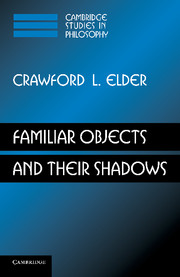Book contents
- Frontmatter
- Contents
- Acknowledgments
- Introduction
- 1 Two false friends of an ontology of familiar objects
- 2 Conventionalism as ontological relativism
- 3 Realism about material objects: persistence, persistence conditions, and natural kinds
- 4 Ontological preference for the temporally small
- 5 Ontological preference for microphysical causes
- 6 Ontological preference for the spatially small
- 7 A third false friend of familiar objects: universal mereological composition
- 8 Concluding Hegelian postscript
- Appendix: “Mutually interfering” dimensions of difference
- References
- Index
3 - Realism about material objects: persistence, persistence conditions, and natural kinds
Published online by Cambridge University Press: 25 January 2011
- Frontmatter
- Contents
- Acknowledgments
- Introduction
- 1 Two false friends of an ontology of familiar objects
- 2 Conventionalism as ontological relativism
- 3 Realism about material objects: persistence, persistence conditions, and natural kinds
- 4 Ontological preference for the temporally small
- 5 Ontological preference for microphysical causes
- 6 Ontological preference for the spatially small
- 7 A third false friend of familiar objects: universal mereological composition
- 8 Concluding Hegelian postscript
- Appendix: “Mutually interfering” dimensions of difference
- References
- Index
Summary
In chapter 1 I argued that judgements of numerical persistence are imperatives, directing us to discover and draw inferences from causal patterns by which newly arriving accidental features will either lead to their own continued presence, or will give way to particular other accidental features, depending on the natural kind to which the persisting object (or portion of matter) belongs. Such causal patterns are clear enough that we can discover them, at least widely enough to have rendered it fruitful for us to heed the imperatives embodied in judgements of numerical persistence – widely enough, then, to have earned for those judgements a place in our conceptual/linguistic repertoire. Where such patterns obtain, they are grounded in the properties essential to the natural kind in question. Thus in treating judgements about an object's course of persistence as guiding us to such patterns, we are treating the events that may befall an object over its course of persistence as governed by the properties essential to the kind to which it belongs. In effect, then, we treat any course of persistence as delimited by some instance of kind-membership. We act as if any object (or sample of matter) can continue to exist only so long as it stays in its natural kind: we treat the conditions on kind-membership as being, at the same time, persistence conditions for the members of that kind.
This position on persistence conditions is philosophically controversial. Nothing said in chapter 1 establishes that it is true.
- Type
- Chapter
- Information
- Familiar Objects and their Shadows , pp. 54 - 69Publisher: Cambridge University PressPrint publication year: 2011



